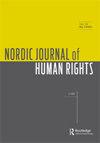An Unlikely Rights Revolution: Legal Mobilization in Scandinavia Since the 1970s
IF 1.2
Q3 POLITICAL SCIENCE
引用次数: 0
Abstract
. Abstract Why have civil society groups in Scandinavia increasingly turned to legal mobilization in recent decades? In Denmark, Norway and Sweden, a legal-political culture based on parliamentary supremacy, deferential judiciaries, strong-state corporatism, and jurispru-dential skepticism towards rights talk supposedly discourages groups in civil society from seeking societal change through litigation. However, in all three countries, diverse groups and organizations in civil society have increasingly adopted litigation strategies for a broad range of causes. In this paper, we seek to account for how and why this shift has occurred. Drawing on socio-legal mobilization theory, we compare Denmark, Norway and Sweden across three episodes from the 1970s to today. Litigation has gradually moved from the political margins to the mainstream. Our findings suggest that while European law, domestic institutional reforms, and a proliferating human rights discourse has opened new ways for resourceful groups and entrepreneurial individuals to challenge the status quo, for mainstream organizations par-liamentary and corporatist channels remain often viable and preferred alternatives. The paper thus contributes to emerging literatures on how civil society groups in Scandinavia employ litigation strategies by offering a comparative, historical assessment, and contributes to knowledge about the factors that shape legal mobilization by civil society groups.不可能的权利革命:20 世纪 70 年代以来斯堪的纳维亚的法律动员
.摘要 近几十年来,斯堪的纳维亚半岛的民间社会团体为何越来越多地转向法律动员?在丹麦、挪威和瑞典,基于议会至上主义、遵从性司法、强势国家公司主义和对权利言论的法学怀疑论的法律政治文化,理应阻碍民间团体通过诉讼寻求社会变革。然而,在这三个国家中,公民社会中的不同团体和组织越来越多地为广泛的事业采取诉讼策略。在本文中,我们试图解释这种转变是如何发生的,以及为什么会发生。借鉴社会法律动员理论,我们对丹麦、挪威和瑞典从20世纪70年代至今的三个阶段进行了比较。诉讼逐渐从政治边缘走向主流。我们的研究结果表明,虽然欧洲法律、国内体制改革和人权话语的扩散为足智多谋的团体和企业家个人挑战现状开辟了新的途径,但对于主流组织而言,议会和公司渠道往往仍是可行的首选。因此,本文通过对斯堪的纳维亚半岛的民间团体如何运用诉讼策略进行历史比较评估,为新出现的文献做出了贡献,并有助于了解形成民间团体法律动员的因素。
本文章由计算机程序翻译,如有差异,请以英文原文为准。
求助全文
约1分钟内获得全文
求助全文
来源期刊

Nordic Journal of Human Rights
POLITICAL SCIENCE-
CiteScore
1.00
自引率
25.00%
发文量
29
期刊介绍:
The Nordic Journal of Human Rights is the Nordic countries’ leading forum for analyses, debate and information about human rights. The Journal’s aim is to provide a cutting-edge forum for international academic critique and analysis in the field of human rights. The Journal takes a broad view of human rights, and wishes to publish high quality and cross-disciplinary analyses and comments on the past, current and future status of human rights for profound collective reflection. It was first issued in 1982 and is published by the Norwegian Centre for Human Rights at the University of Oslo in collaboration with Nordic research centres for human rights.
 求助内容:
求助内容: 应助结果提醒方式:
应助结果提醒方式:


